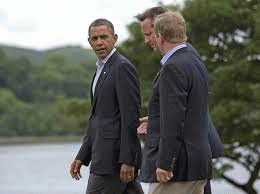The bellicose rhetoric from the meeting in Paris between Kerry, French Foreign Minister Laurent Fabius and British Foreign Minister William Hague underscored sharp differences with Russia, which warned that the threats from the West could undermine any chance of a negotiated end to Syria's two-and-a-half-year-old civil war.
"If Assad fails in time to abide by the terms of this framework, make no mistake, we are all agreed -- and that includes Russia -- that there will be consequences," Kerry said. Kerry claimed that Russia had indicated its support for a Security Council resolution that would invoke Chapter VII of the UN charter, which authorizes the use of military force, if Syria failed to comply.
The message from the meeting in Paris echoed threats made over the weekend by both US President Barack Obama and French President Francois Hollande, whose government was the only one in the world to commit to joining the US in its planned aggression against Syria.
"If diplomacy fails, the United States remains prepared to act," Obama warned in a television interview on Sunday.
In an address delivered the same day, French President Hollande declared, "The military option must remain; otherwise there will be no pressure."
A US war fleet remains deployed in the eastern Mediterranean poised for striking Syria. The Pentagon has announced that it will remain in place indefinitely.
After a rapid buildup to war last month -- using as a pretext the unsubstantiated claim that the Assad government was responsible for an August 21 chemical weapons attack near Damascus -- Washington's plans for a unilateral and illegal attack on Syria were upended by the mass popular hostility to war both in the United States and internationally. Reeling from the British Parliament's unprecedented vote on August 29 to reject a resolution backing military action, Obama turned to the US Congress for an Authorization of the Use of Military Force (AUMF) resolution.
Here too, the opposition of the American people to another Middle East war based upon lies stymied the US president's plans. Members of Congress confronting constituents who in their overwhelming majority demanded no war in Syria found it too dangerous to support the AUMF, and Obama faced the humiliating and unprecedented prospect of being denied Congressional approval for launching a war.
It was under these conditions that the administration stumbled into the negotiations with Russia on a proposal for the chemical disarmament of the Syrian regime. While the agreement reached in Geneva on Saturday has apparently postponed an immediate attack on Syria, the threats emerging from Washington and its allies suggest that the disarmament process -- the so-called path to diplomacy -- could rapidly lead to a major war.
Weapons experts have warned that the breakneck timetable imposed by the US-Russian deal, which demands the destruction of all Syria's chemical weapons by the middle of next year, is practically impossible under any conditions, much less those of a civil war prevailing in Syria.
The three Western powers also seized upon the United Nations weapons inspectors' report on the August 21 incident released Monday by UN Secretary General Ban ki-Moon as further fodder for war propaganda.
The report, French Foreign Minister Fabius claimed, "leaves no doubt on the origin of the attack," while the US ambassador to the United Nations, Samantha Powers said that the details of the report "make clear that only the regime could have carried" it out.
In fact, the report did no such thing. It ascribed no blame, concluding that "chemical weapons have been used in the ongoing conflict between the parties in the Syrian Arab Republic," based on medical evidence, interviews with survivors and recovery of a rocket containing traces of sarin.
A separate body, the UN Commission of Inquiry on Syria, is preparing to investigate some 14 alleged chemical weapons attack from the standpoint of determining who was responsible. The Syrian regime has charged that its own soldiers as well as civilians have been killed by chemical munitions used by the CIA-backed militias fighting to topple the Assad regime.
One of the senior members of the UN commission, Carla Del Ponte, a former chief prosecutor in two UN war crimes tribunals, revealed last May that evidence pointed to the use of chemical weapons, including sarin, by the so-called rebels.





